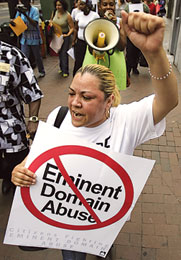 |
| Up in Arms. Opponents get help. (Photo by AP/Wideworld) |
President Bush has weighed in on the debate over the use of eminent domain to spur economic development projects. He issued an executive order June 23 that bars federal agencies from seizing property through eminent domain except for public works projects, such as roads. Most eminent domain activity occurs at the state and local levels, but Bert Gall, an attorney with the Institute for Justice, claims Bush’s directive sends a message to Congress, where legislation aimed at curbing eminent domain is pending.
Last November, the House passed a bill, 376-38, to cut federal economic development aid to states and localities for two years if they use eminent domain for development projects. In the Senate, the bill is being considered by the Judiciary Committee, but there has been no substantive action in the chamber. “The federal government doesn’t really use eminent domain for private development, but...this order encourages the Senate to pass the House bill,” says Gall.
Bush signed his order on the first anniversary of the Supreme Court’s decision in Kelo v. New London. The court ruled the city of New London, Conn., could use eminent domain to transfer property from one private owner to another for an economic development project.
Eminent domain use has been rising since Kelo, according to a study co-authored by the Institute for Justice. It says 5,429 properties were threatened by eminent domain in the year after Kelo, compared to 10,282 properties between 1998 and 2002.
Kelo also has sparked a backlash. In January through May, 325 eminent domain bills were introduced in 42 states, says the U.S. Conference of Mayors. The measures ranged from defining appropriate uses of the procedure to banning it for purposes other than public works.
Several mayors are concerned that the bill in Congress will bring an end to many development projects that benefit their communities. Philadelphia, which says it has the most abandoned real estate, per capita, of any U.S. city, seizes about 2,000 properties a year and develops 500 to 600 affordable housing units, says Philadelphia Redevelopment Authority Executive Director Herb Wetzel. “An outright ban on the conveyance of property to private citizens through use of eminent domain would mean none of those units could be built,” he says.
Bill Hudnut, senior fellow at the Urban Land Institute and former mayor of Indianapolis, says some municipalities abuse eminent domain, but most projects are necessary. “This is a knee-jerk reaction by politicians jumping on a temporary issue because they think there’s political mileage in it,” he says. “They are trying to kill a fly with a sledgehammer.”

Post a comment to this article
Report Abusive Comment